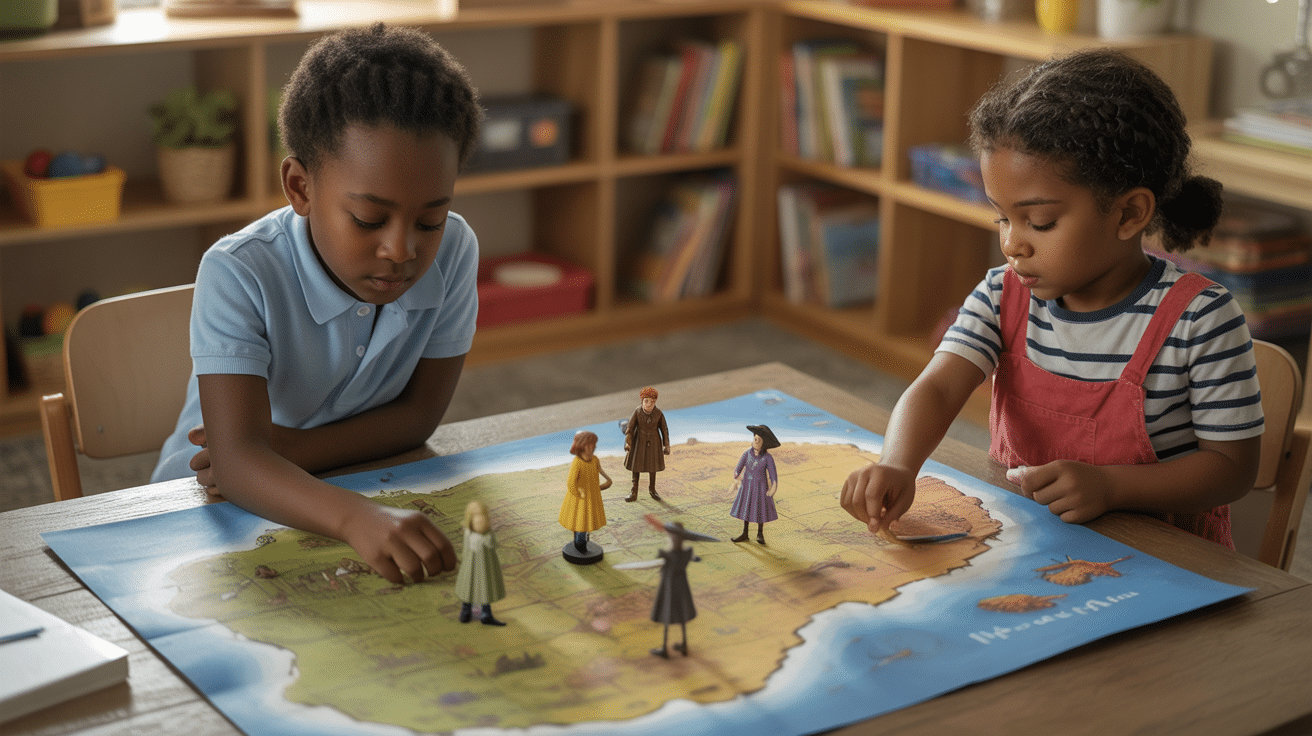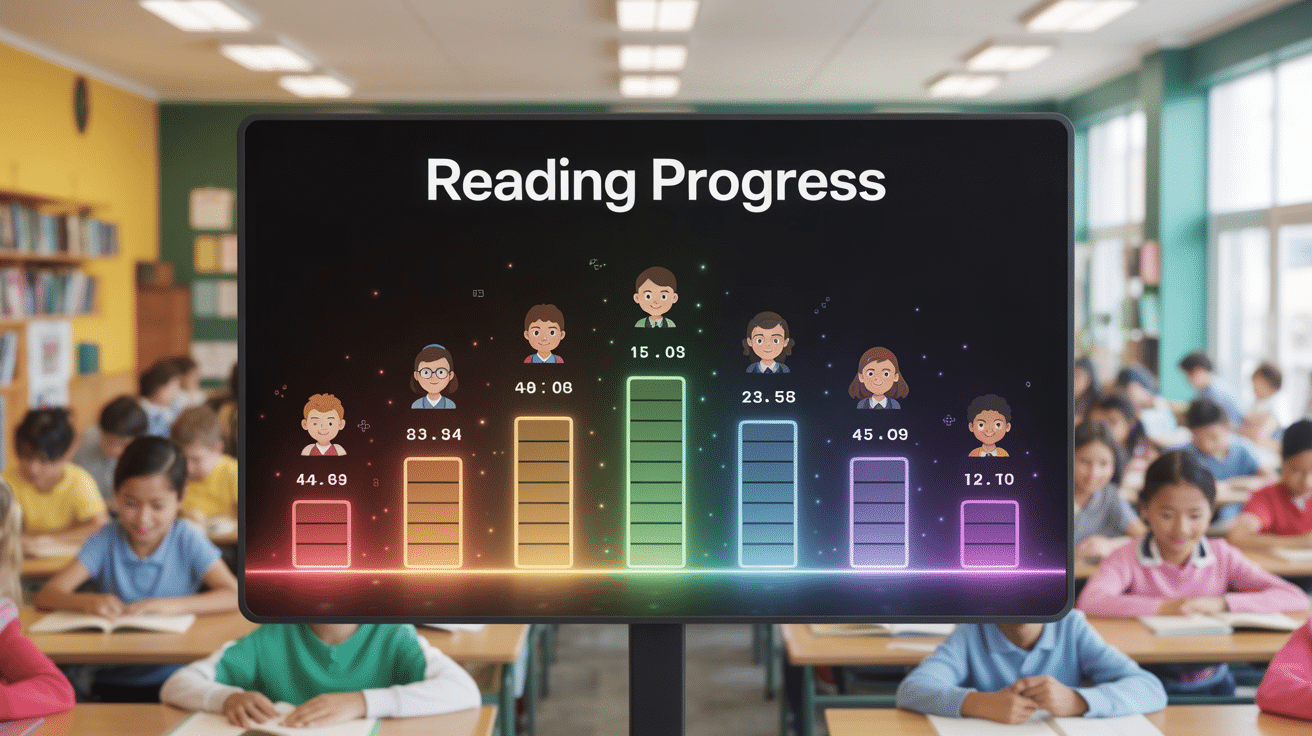There’s nothing quite like watching a child’s face light up when they fall in love with a story.
Yet many parents and teachers struggle to find reading activities that truly capture young imaginations and hold their attention.
Simple, creative approaches can convert any reluctant reader into an enthusiastic book lover. These fun reading activities don’t require fancy materials or complicated setups, just a willingness to make stories come alive.
Let’s find practical ways to turn reading time into the highlight of any child’s day.
Cracking the Code of Reluctant Readers
Children often avoid reading for three main reasons: boredom, difficulty levels that don’t match their skills, and stories that feel disconnected from their world.
Traditional reading methods can feel like work rather than play.
But here’s where fun strategies make all the difference. When children move their bodies while learning letters, act out story scenes, or create crafts based on characters, reading becomes an experience rather than a chore.
These multisensory approaches align perfectly with how young brains naturally learn through touch, movement, and exploration.
Research shows that playful reading activities boost retention by 40% and improve fluency faster than traditional methods. Children also build stronger vocabularies and gain confidence when learning feels like play.
Fun Reading Activities to Spark Joyful Literacy
Turn reading struggles into smiles with these simple, fun reading activities that work like magic. These proven strategies help any child fall in love with books, no fancy materials required, just creativity and fun.
Low-Prep and Silly Reading Games

These simple activities require minimal setup but deliver maximum giggles. Parents can prepare most of these fun reading activities in under five minutes.
1. Reading Bingo
Create a bingo card filled with fun prompts like “Read under a blanket” or “Read to a stuffed animal.” Kids check off squares as they complete each reading challenge.
This simple game encourages children to read in different settings and moods, making every reading session feel fresh and exciting.
- Age/Stage: Ages 5-10, Beginning to Independent Readers
- Skills: Reading motivation, habit building, and environmental awareness
2. Silly Voice Cards
Children pick cards that tell them to read like a robot, monster, or opera singer. Each card transforms their voice and brings characters to life in hilarious ways.
This activity builds fluency while turning reading practice into a giggle fest that kids actually look forward to.
- Age/Stage: Ages 4-8, Emergent to Early Readers
- Skills: Fluency, expression, confidence, phonics practice
3. Sight Word Swat
Write common sight words on sticky notes around the room. Call out a word and watch children race to swat the correct one with a fly swatter.
The physical movement combined with word recognition creates an energetic learning experience that reinforces quick word identification.
- Age/Stage: Ages 5-7, Beginning Readers
- Skills: Sight word recognition, quick recall, gross motor coordination
4. Roll-a-Story
Use a simple die to determine story elements like character, setting, and problem. Then children read or create a matching story based on their rolls.
This activity boosts imagination while helping young readers understand how stories are structured and built.
- Age/Stage: Ages 6-10, Early to Independent Readers
- Skills: Story structure, creativity, narrative comprehension, sequencing
5. Book Hat Parade
After reading a book together, children craft silly paper hats that represent a favorite character or theme. They can parade around wearing their creations while sharing what they learned.
This hands-on activity links story comprehension to creative expression in a memorable way.
- Age/Stage: Ages 4-9, All Reading Levels
- Skills: Comprehension, creativity, character analysis, fine motor skills
6. Story Dice Toss
Toss dice featuring pictures or story themes, then build a tale sentence-by-sentence based on each roll.
Children take turns adding to the story, creating something completely new together. This collaborative approach encourages sequencing skills and story-building abilities.
- Age/Stage: Ages 5-10, Early to Independent Readers
- Skills: Sequencing, creativity, oral language, story structure
7. Character Charades
One child acts out a character from a recently read story while others guess who it is.
The actor can use gestures, expressions, and movements but no words. This physical activity reinforces character traits and keeps children engaged with story details long after reading ends.
- Age/Stage: Ages 5-12, All Reading Levels
- Skills: Character analysis, inference, dramatic expression, comprehension
8. Read-and-Move Challenge
Assign specific movements to word families or sight words, like jumping for words ending in “-ing” or clapping for the word “the.”
Children read the text, then perform the matching movements. This approach blends reading practice with gross motor skills for active learners.
- Age/Stage: Ages 4-8, Emergent to Early Readers
- Skills: Word recognition, phonics patterns, gross motor skills, kinesthetic learning
9. Mystery Word Puzzles
Children work through reading clues to reveal a hidden sentence or phrase. Each solved clue brings them closer to the final mystery message.
This detective-style activity develops problem-solving skills while encouraging careful attention to context and meaning.
- Age/Stage: Ages 7-11, Early to Independent Readers
- Skills: Context clues, problem-solving, inference, vocabulary building
10. Reading Relay
Teams take turns reading pages from funny or rhyming books in a friendly race format. Each team member reads one page before passing the book to the next reader.
This group activity adds excitement and teamwork to reading aloud practice.
- Age/Stage: Ages 6-10, Early to Independent Readers
- Skills: Fluency, teamwork, oral reading, confidence building
Themed Reading Adventures and Roleplay

These fun reading activities require more preparation but create lasting memories. Children engage deeply with stories through hands-on experiences.
11. Reader’s Theater
Give children simple scripts based on their favorite books, no memorization required. They practice reading their parts with expression and perform for family or classmates.
This activity improves fluency, builds confidence, and helps children understand how punctuation affects meaning and tone.
- Age/Stage: Ages 6-12, Early to Independent Readers
- Skills: Fluency, expression, confidence, comprehension, collaboration
12. Book-Based Scavenger Hunt
Create lists of specific items or phrases for children to find while reading, like “a red object” or “someone laughing.” They hunt through pages to locate each item on their list.
This focused approach encourages attentive, careful reading and attention to detail.
- Age/Stage: Ages 5-10, Beginning to Independent Readers
- Skills: Close reading, attention to detail, comprehension, following directions
13. Dress Like a Character Day
Children come dressed as their favorite book character and explain what makes that person special. They can share favorite quotes, describe personality traits, or act out scenes.
This activity strengthens character understanding and helps develop inference skills.
- Age/Stage: Ages 4-12, All Reading Levels
- Skills: Character analysis, inference, oral presentation, creativity
14. Book-Inspired Craft Corner
After reading together, children create crafts related to the story—like making crowns after “The Paper Bag Princess” or building towers after “Rapunzel.”
These hands-on projects connect text understanding to creative expression. The physical creation process helps cement story memories.
- Age/Stage: Ages 3-10, All Reading Levels
- Skills: Comprehension, creativity, fine motor skills, story connection
15. Story Mapping Experience
Children create visual maps showing the beginning, middle, and end of their favorite books. They can draw pictures, write key events, or use symbols to represent important story moments.
This visual approach reinforces sequencing skills and plot structure understanding.
- Age/Stage: Ages 5-11, Beginning to Independent Readers
- Skills: Sequencing, plot structure, visual organization, comprehension
16. Character Interviews
One child pretends to be a book character while others ask questions about their experiences, feelings, or motivations. The “character” answers based on story details and logical inferences.
This role-playing activity deepens understanding through perspective-taking and critical thinking.
- Age/Stage: Ages 6-12, Early to Independent Readers
- Skills: Perspective-taking, inference, character analysis, oral communication
17. Reading Camp-In
Transform any space into a cozy reading camp with blankets, flashlights, and snacks.
Turn off overhead lights and read spooky or funny tales by flashlight. This special atmosphere makes reading feel like a memorable event rather than a daily task.
- Age/Stage: Ages 4-12, All Reading Levels
- Skills: Reading motivation, atmosphere creation, shared experience, enjoyment
18. Book Passport Game
Each time children finish a book, they stamp a pretend passport and record their reading journey.
They can note favorite characters, new words learned, or star ratings. This tracking system builds consistent reading habits while encouraging goal-setting and reflection.
- Age/Stage: Ages 5-12, All Reading Levels
- Skills: Goal setting, reading habits, self-monitoring, motivation
19. Book vs. Movie Comparison
After reading a book, children watch its movie version and discuss which format told the story better.
They compare characters, plot changes, and personal preferences while explaining their reasoning. This activity develops comparison skills and critical thinking abilities.
- Age/Stage: Ages 7-12, Independent Readers
- Skills: Critical thinking, comparison, media literacy, analytical discussion
Digital & Interactive Reading Fun

Technology can upgrade rather than replace traditional reading. These digital activities support literacy while meeting kids in their tech-comfortable world.
20. Talking Book Apps
Use read-along apps like Epic! or Vooks that highlight words as they’re spoken aloud. Children can follow along at their own pace while hearing proper pronunciation and expression.
This multisensory approach particularly supports beginning readers and English language learners.
- Age/Stage: Ages 3-8, Emergent to Early Readers
- Skills: Fluency, pronunciation, listening comprehension, sight word recognition
21. QR Code Book Hunt
Create QR codes that link to digital books, reading clues, or book-related websites. Children scan codes with tablets or phones to access their next reading challenge.
This modern treasure hunt combines technology exploration with reading practice in an engaging format.
- Age/Stage: Ages 6-12, Early to Independent Readers
- Skills: Technology literacy, following directions, reading motivation, problem-solving
22. Reading Podcasts for Kids
Children listen to storytelling podcasts designed for young audiences, sometimes following along with provided transcripts. Popular options include “Circle Round” and “Story Pirates.”
This audio format enhances listening skills while exposing children to rich vocabulary and storytelling techniques.
- Age/Stage: Ages 4-10, All Reading Levels
- Skills: Listening comprehension, vocabulary exposure, attention span, story appreciation
23. Virtual Author Visits
Watch recorded or live video interviews with children’s book authors through school programs or library events. Children learn about the writing process and connect with real people behind their favorite stories.
This personal connection often inspires increased reading motivation and interest.
- Age/Stage: Ages 5-12, All Reading Levels
- Skills: Reading motivation, writing process understanding, connection building, inspiration
24. Digital Word Scramble
Use educational apps like Wordshake or ABCya to unscramble vocabulary words from recently read books. Children race against time to solve word puzzles while reinforcing spelling patterns.
This game-based approach makes vocabulary practice feel like play rather than work.
- Age/Stage: Ages 6-11, Early to Independent Readers
- Skills: Spelling, vocabulary reinforcement, problem-solving, pattern recognition
25. Interactive Reading Quiz Games
Create story-based quiz games using platforms like Blooket or Google Slides. Children answer questions about characters, plot events, and story details in a game show format.
This friendly competition reviews important story elements while maintaining high engagement levels.
- Age/Stage: Ages 7-12, Independent Readers
- Skills: Comprehension review, recall, competitive motivation, story analysis
26. Storytelling with AI Tools
Use child-friendly AI platforms to co-write stories with digital assistance.
Children provide ideas while the AI helps develop plots and characters. This collaborative approach encourages creativity while introducing basic digital literacy concepts in a safe, supervised environment.
- Age/Stage: Ages 8-12, Independent Readers
- Skills: Creativity, digital literacy, collaboration, story development
27. E-Book Clubs with Friends
Set up virtual reading groups using video platforms where children can discuss books together. Everyone accesses the same digital book and meets online to share thoughts and reactions.
This social approach builds community around reading while developing discussion skills.
- Age/Stage: Ages 8-12, Independent Readers
- Skills: Social reading, discussion, critical thinking, technology use
28. Voice-Record Reading Practice
Children record themselves reading aloud using simple recording apps, then listen back to hear their progress. This self-monitoring technique helps them notice areas for improvement while building confidence.
Parents and teachers can track fluency development over time.
- Age/Stage: Ages 5-10, Beginning to Independent Readers
- Skills: Self-monitoring, fluency development, confidence building, oral expression
29. Create a Digital Book Trailer
Using simple video editing apps, children create short movie trailers for their favorite books. They can include images, music, and brief plot summaries to “sell” the book to other readers.
This project combines story summarization with basic digital storytelling skills.
- Age/Stage: Ages 8-12, Independent Readers
- Skills: Summarization, digital storytelling, creativity, media literacy
Adapting Activities for Different Ages & Reading Levels
- Kindergarteners need simpler modifications: use picture cards instead of written prompts, focus on letter sounds rather than whole words, and keep activities under 10 minutes. Single-syllable sight words work best for swat games and bingo cards.
- Third graders can handle complex story mapping, character interviews with deeper questions, and longer scavenger hunts. They can create detailed book trailers and participate in meaningful book vs. movie discussions.
- Struggling readers benefit from partner reading, audio support, and visual cues. Start with familiar topics and shorter texts. Success builds confidence faster than challenge.
- ELL students need picture-heavy activities, gesture-based games, and culturally familiar stories. Pair new vocabulary with actions or drawings. Let them share stories from their own cultures to build connections.
Where to Find the Best Reading Activity Resources
| Resource Type | Platform/Website | What You’ll Find | Cost |
|---|---|---|---|
| Free Educational Sites | Scholastic Book Clubs | Interactive stories, phonics games | Free |
| Reading Rockets | Research-backed activities, tips | Free | |
| Starfall | Phonics games, interactive books | Free + Premium | |
| Printable Marketplaces | Teachers Pay Teachers | Themed worksheets, activity packets | $1-15 |
| Education.com | Skill-building worksheets, games | Free + Premium | |
| Digital Tools | Epic! Books | Digital library, read-aloud features | Subscription |
| ABCmouse | Interactive lessons, progress tracking | Subscription | |
| Educator Blogs | The Measured Mom | DIY activities, printables | Free |
| This Reading Mama | Hands-on learning ideas | Free |
Disclaimer: These resources are widely used, but quality may vary especially on open marketplaces. Please review materials for suitability before use. This table is for informational purposes only and does not imply endorsement. Availability and pricing may change.
Takeaway
These fun reading activities prove that learning doesn’t have to feel like work. With just a sprinkle of creativity and the right approach, any parent or teacher can transform reading time from a daily struggle into the moment children look forward to most.
The magic happens when adults stop worrying about perfection and start focusing on joy.
Whether it’s silly voices, movement games, or digital adventures, the goal remains simple: help children fall in love with stories.
Start small. Pick one activity that feels manageable. Watch how quickly reluctant readers become eager participants when learning feels like play.
















